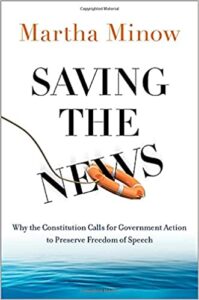Martha Minow
“The constitution is not a suicide pact.”
July 27, 2021“We can and must do more to regulate and support distribution of reliable news.”
CNN public editor: Why CNN’s audience deserves federally regulated news
by Ariana Pekary
Ariana Pekary is the CJR public editor for CNN. She was an award-winning public radio and MSNBC journalist for two decades. Now she focuses on the systemic flaws of commercial broadcast news. She can be contacted at publiceditors@cjr.org.
CNN, AS I’VE WRITTEN BEFORE, has amplified disinformation, relies on panel discussions that increase polarization, and has neglected voices of moderation for the sake of ratings. But is there some way to mitigate such problems, which are so common in cable news? Martha Minow, a professor at Harvard Law School, argues that the Constitution requires efforts to protect the free press––including regulation.
In Saving the News, Minow describes the merits of “deep and extensive government involvement in funding, shaping, and regulating media.” Some may balk at the notion of federal intervention in the news. But Minow chronicles how the government has granted newspapers low postal rates, invested in research that created the internet, established licensing protocols for broadcasters, and regulated telephone lines and features of digital platforms––involving itself in essential elements of the nation’s media infrastructure.
“If the ecosystem fails to provide necessary information to citizens,” she told me, “then democracy dies—and the Constitution is not a suicide pact.”
Minow argues that the First Amendment implies the existence of a functional press, so the government has an obligation to enact reforms and regulations to protect it. Many consider the industry to be a public utility, and therefore subject to regulation. And, as Minow explains in Saving the News, “Regulation of a necessary good or service also helps guard against coercion that works by exploiting people’s dependence, but it still permits private owners to operate for profit.”
The now-defunct Fairness Doctrine, which mandated journalistic balance by requiring broadcasters to air multiple viewpoints, is one example of successful oversight, Minow said. Supreme Court justices wrote in 1969 that it was a “protection for ‘the right of the viewers and listeners, not the right of the broadcasters.’ ” Public interest, Minow notes, is a vital characteristic of government intervention. Accordingly, we may deduce that the public has authority over an outlet like CNN to protect the audience.
The United States has a long, if forgotten, history of funding the news media.
In The Death and Life of American Journalism, Robert McChesney and John Nichols––cofounders of Free Press, a media reform group––calculated that “the level of government subsidy given to the American press in the 1840s was the equivalent of $30 billion in 2010 dollars.” But federal funding of public media amounted to just $465 million in 2020––an extraordinarily low amount compared with other countries.
Subsidizing public media, Minow told me, would “provide crucial competition and can stimulate for-profits to win viewers by doing better.” Sesame Street, for example, did not exist before broadcasters knew that the format would be popular. Now it’s competitive and profitable. We could use other public-private partnerships, similar to the current collaboration with ProPublica, to create new informative TV programs, she says, calling it a “public option” for journalism.
Other possibilities include tax incentives; for instance, if CNN adopted a certain set of ethical standards (see the Society of Professional Journalists’ as an example), then it could receive tax benefits for implementing procedures in the public interest. Minow said the government could also encourage measures to label news programming, to more clearly “distinguish news, analysis, and opinion.”
As a democratic nation, we may have lost sight of the need for an informed electorate. Commercial outlets dominate our media environment. But in Saving the News, Minow reminds us of our constitutional obligations. We can and must do more to regulate and support distribution of reliable news. CNN’s audience deserves it. All American audiences do.
The Society of Professional Journalists is the former Sigma Delta Chi, founded at DePauw University.
